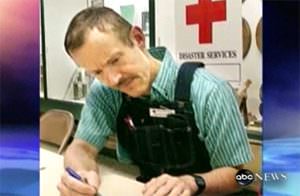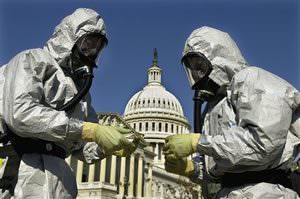Anthrax Researcher Threatened Co-Workers as FBI Closed In
Friends' and relatives' memories of microbiologist Bruce E. Ivins, who apparently committed suicide last week as he became a top suspect in the 2001 anthrax attacks, differ greatly from the image of him invoked by the stories that have emerged about his threatening behavior in recent months.Friends’ and relatives’ memories of microbiologist Bruce E. Ivins, who apparently committed suicide last week as he became a top suspect in the 2001 anthrax attacks, differ greatly from the image of him invoked by the stories that have emerged about his threatening behavior in recent months.
Your support matters…The Washington Post:
In March, police officers summoned to a quiet Frederick neighborhood found the 62-year-old microbiologist unconscious in his home. Four months later, he was admitted to a psychiatric clinic after making wild threats against co-workers at the Army research institute where he kept his lab. Then, a week ago, his therapist urgently petitioned a judge for protection from Ivins. She described a man spiraling out of control, making “homicidal threats, actions, plans.”
His death Tuesday from a drug overdose was followed by a revelation even more jarring to those who knew him: a report that Ivins had been implicated in the 2001 anthrax attacks, one of the FBI’s biggest unsolved mysteries and most baffling technical cases. Ivins, a leading expert on anthrax vaccines, was on the verge of being indicted in the case, according to officials familiar with the investigation, and took his life by swallowing a large quantity of acetaminophen.
Independent journalism is under threat and overshadowed by heavily funded mainstream media.
You can help level the playing field. Become a member.
Your tax-deductible contribution keeps us digging beneath the headlines to give you thought-provoking, investigative reporting and analysis that unearths what's really happening- without compromise.
Give today to support our courageous, independent journalists.



You need to be a supporter to comment.
There are currently no responses to this article.
Be the first to respond.